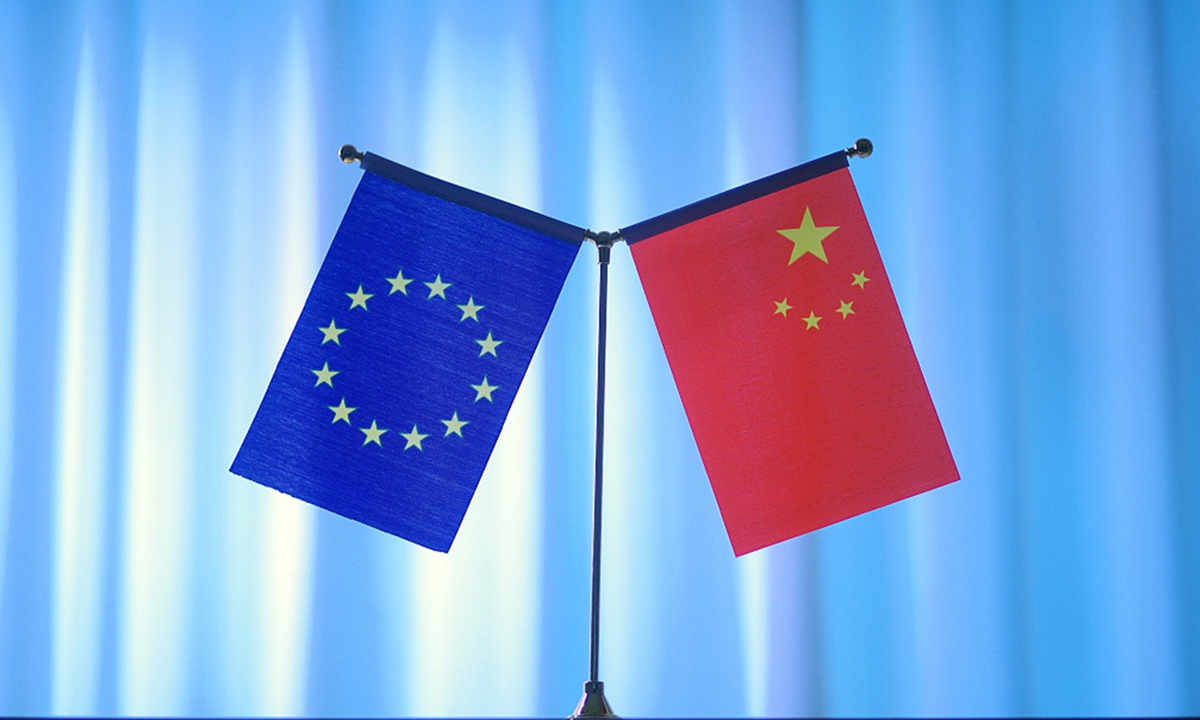
China EU. Photo: VCG
After multiple rounds of seven-year-long negotiations, China and the EU finally completed negotiations on their bilateral investment treaty (BIT). Over the past four years, the Trump administration and its wild card unilateralism has caused enormous damage to the global free trade system.
The unexpected COVID-19 pandemic has also led to the global economic recession. The completion of BIT talks between China and the EU at the end of 2020 has injected momentum for global growth in 2021.
The finalization of China-EU investment treaty talks is an inevitable result of the international political and economic dynamics — and a decisive choice made upon the strategic interests of both sides. China has been actively promoting an international economic order based on mutual interest, and China and the EU are complementary in terms of industrial structures. China poses no geopolitical or security threat to the EU, and has always supported the integration process of Europe. Deepening the economic cooperation of the Chinese and European markets has been the policy orientation of the Chinese government.
For quite a long time, Europe was reluctant to accept China's rapid rise and viewed it as a systematic rival. In recent years, European leaders have enhanced their understanding of China and realized that the country is not a threat to world peace. They see that China bears great significance for the future development of Europe. They also experienced horrific US unilateral foreign policies, and saw how it hurt the EU's core interests. An independent foreign policy and open mind-set fits the EU's interests. This change is a key factor in the finalization of China-EU talks.
The finalization has set an example of win-win international economic relations. Although economic globalization is an inevitable trend, unilateralism, anti-globalization and economic nationalism have become obstacles. According to the commitment reached during the talks, China and Europe will set up a mutually beneficial high-level cooperation mechanisms in terms of market entry, fair competition, subsidy transparency and business environment, so as to create more market opportunities for each other. With the utmost sincerity, both sides have responded positively and explicitly to each other's core concerns.
Connecting Europe and Asia is the common goal of both China and the EU. The completion of the BIT talks has opened up room for trans-continental cooperation. The China-proposed Belt and Road Initiative and the EU strategy of connecting Europe and Asia both articulate such grand visions. Compared with the US which keeps destabilizing the Asia-Pacific region with both military and political means, the EU views Asia as a destination for economic cooperation. The Regional Comprehensive Economic Partnership (RCEP) signed in November has accelerated the process of economic integration in Asia. The China-EU investment treaty will partner with the RCEP to provide opportunities for market integration and industrial cooperation between Europe and Asia.
The significance of China-Europe cooperation is not limited to economic growth. The cooperation between the two major civilizations will demonstrated new modes of global civilization. European civilization is the origin of modern industrialization. Since the Age of Enlightenment during the 17th and 18th centuries, Europe has tended to view China as a mysterious "alien" force and did not pay much attention. Since the onset of the 21st century, Europe has found itself unable to adapt to China's rapid rise and even viewed China as a "red terror." The deepening of China-Europe economic cooperation will pave the way for the two civilization to comprehensively understand each other and view their characteristics and differences with open minds. It is even possible to explore new modes of modern industrial life for the benefit of humanity.
It is worth pointing out that the incoming Biden administration will not view in-depth China-Europe cooperation as a good news, as it has pledged to repair trans-Atlantic ties. Deeper China-EU ties will decrease possibility that the US will be able to hijack Europe for its anti-China chariot. Hopefully, the completion of the China-EU BIT talks will sound an alarm bell to the US administration and send this message: cooperation is the only way out for China-US relations. After all, the door of international multilateral cooperation has always been open to the US.
The author is a scholar at Shanghai International Studies University. opinion@globaltimes.com.cn




